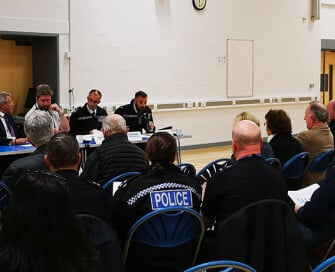Taverham hosts PCC's policing Q&A
Officer numbers, police visibility, drugs and anti-social behaviour were just a few of the issues raised at a special question and answer session hosted by Norfolk’s Police and Crime Commissioner (PCC) and Chief Constable in Taverham yesterday evening.The event was the fifth of its kind to be held in the county during 2018 as part of the Commissioner’s ongoing pledge to give the public access to the county’s senior officers while ensuring he and the wider police service are visible, accessible and accountable to all.
Taverham High School was the venue for the event which gave attendees the opportunity to find out about policing in their area, meet senior officers and raise their crime and policing concerns.
Getting an overview of police activity and priorities from the District Superintendent Chris Harvey, the meeting heard that Broadland has one of the lowest levels of crime and anti-social behaviour in the country. Superintendent Harvey credited the relationship between police and communities sharing information and reporting issues in their area, as well as the hours put in by volunteers such as Specials, Cadets and SpeedWatch teams, as contributing to keeping the district safe.
Giving an insight into policing operations and calls for service in the area, Superintendent Harvey reported that the district policing team dealt with an average of 11 crimes per day, with incidents in care settings, missing person reports and activity on the A47 and Broadland Northway creating a variety of demand in the patch.
Asked about use of police resources and officer visibility, Norfolk’s Chief Constable spoke of the ongoing financial challenges facing the Force. With a reduction of 400 officers since 2008/09, £32m taken out of the police budget since 2010, and a ‘worst case scenario’ of a further £15m to find, the Chief Constable said that deployment of police resources had to be led by demand. He advised attendees that, while he understood it was reassuring to see police officers on the beat in their local area, the policing demand from violent crime, domestic abuse and sexual offences meant these areas had to be prioritised.
The Chief Constable said the Force was having to work smarter to make available resources go further. He referenced investment from the PCC in technology such as drones, bodyworn cameras for frontline officers, and automatic number plate recognition networks to support policing teams in disrupting and detecting criminal activity using Norfolk’s roads as some of the ways they were doing that.
Both the Chief Constable and PCC reiterated their commitment to protecting neighbourhood policing and a uniformed presence to the best of their ability, but said it was becoming increasingly difficult to meet public expectations.
Other questions from Broadland residents covered subjects such as domestic abuse and police officer training, work being undertaken to prevent crime, as well as the Constabulary’s work with its partner agencies.
Attendees were given an overview of police involvement in partnership work, such as through Norfolk’s Multi-Agency Safeguarding Hub and Safer Schools Partnership, and the PCC spoke of the partnership projects his office was helping to fund, including those to tackle domestic abuse.
The meeting also welcomed representatives from the Norfolk Youth Commission which was set up by the PCC to ensure young people’s voices were heard in discussions about policing and crime, and their needs understood by police and partners. As well as putting their questions to the Panel, the Youth Commission also offered to work with the policing team in the Broadland district to support their engagement with young people.

Published